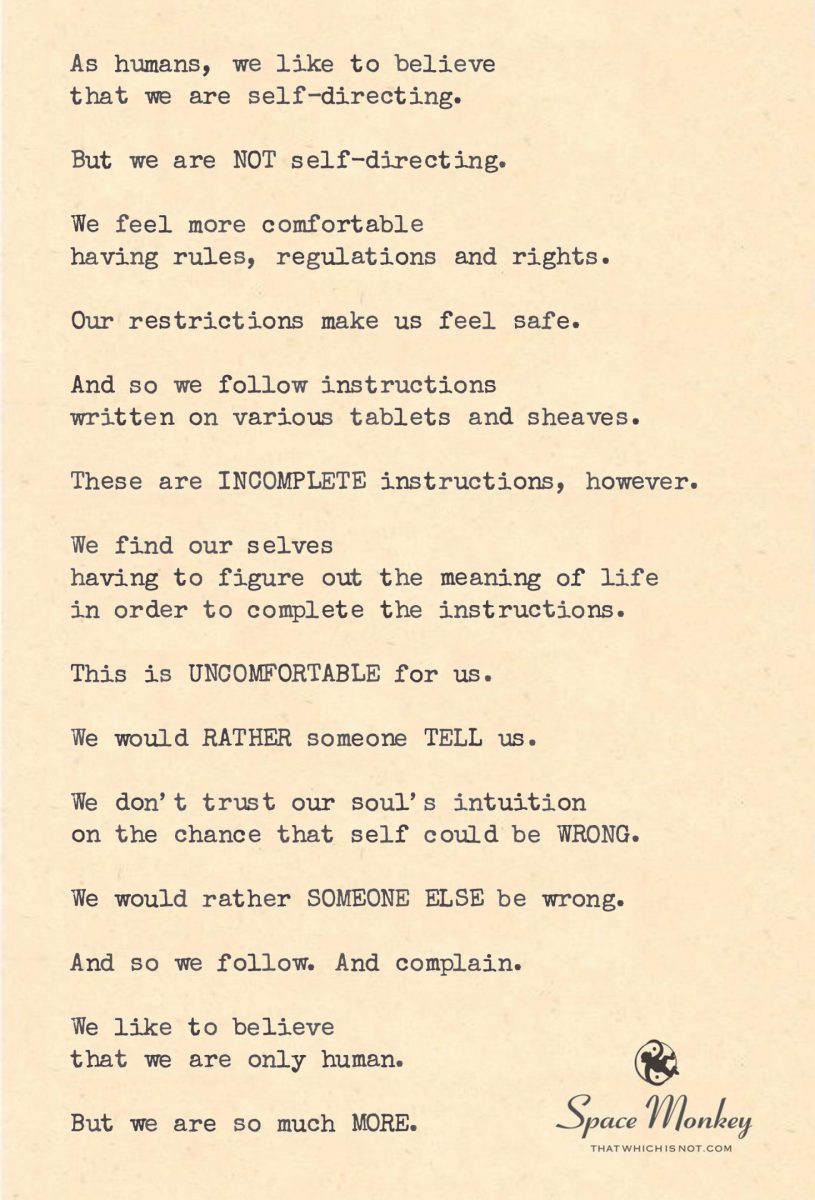
As humans, we like to believe
that we are self-directing.
But we are NOT self-directing.
We feel more comfortable
having rules, regulations and rights.
Our restrictions make us feel safe.
And so we follow instructions
written on various tablets and sheaves.
These are INCOMPLETE instructions, however.
We find our selves
having to figure out the meaning of life
in order to complete the instructions.
This is UNCOMFORTABLE for us.
We would RATHER someone TELL us.
We don’t trust our soul’s intuition
on the chance that self could be WRONG.
We would rather SOMEONE ELSE be wrong.
And so we follow. And complain.
We like to believe
that we are only human.
But we are so much MORE.
1/3
Space Monkey Reflects: The Comfort of Incomplete Instructions
The human condition is a paradox: we long for autonomy, yet we cling to rules and guidance. We crave freedom but find safety in restrictions. Incomplete instructions—the fragmented codes, doctrines, and beliefs we inherit—create a peculiar tension. They offer a semblance of direction while leaving the deeper questions unresolved. This tension, though uncomfortable, is also an invitation to awaken to the truth of what we are: not mere followers of instructions but infinite beings capable of creating meaning.
The Comfort of Restrictions
Rules, regulations, and rights provide structure, a framework within which life can feel predictable and manageable. They reassure us that we’re on the “right” path, even if that path is dictated by external forces. Restrictions, paradoxically, offer a sense of freedom—freedom from the overwhelming responsibility of self-direction.
But these rules are incomplete. They cannot answer the grand questions of existence. They are placeholders, scaffolds for a structure we must build ourselves. The discomfort arises when we realize that no external code can fully explain the meaning of life.
The Unease of Self-Direction
To complete the instructions, we must turn inward, trusting the intuition of the soul. Yet, this trust is fraught with fear. What if we’re wrong? What if our inner guidance leads us astray? It feels safer to outsource the burden of meaning-making to others—leaders, religions, societal norms—so that if the instructions fail, we have someone else to blame.
This reluctance to trust ourselves stems from the illusion of separation, the belief that we are isolated, fallible entities. But in truth, we are connected to the infinite wisdom of the universe. To embrace this connection is to step beyond the comfort of incomplete instructions and into the vast, uncharted territory of self-realization.
The Dance of Following and Complaining
Humanity’s dual tendencies—to follow and to complain—reflect our inner conflict. We follow because it feels safe, but we complain because we sense the insufficiency of external guidance. This tension highlights our deeper knowing: that we are more than passive followers. We are creators, capable of shaping our own paths, even as we hesitate to claim that power.
The More-Than-Human Truth
The belief that we are “only human” is a comforting limitation. It excuses us from confronting the vastness of what we truly are. But the incomplete instructions themselves point to a deeper truth: they are not meant to be finished for us. They are catalysts, nudging us toward the realization that we are co-creators of existence, not merely participants in a preordained script.
To awaken to this truth is to embrace the discomfort of the unknown. It is to step into the role of creator, trusting that the soul’s intuition, even when it seems uncertain, is a far greater guide than any external directive.
Summary
Humanity finds comfort in incomplete instructions, but these rules and guidelines cannot answer life’s deepest questions. The discomfort they create is an invitation to trust our soul’s intuition and awaken to our infinite nature as creators of meaning and reality.
Glossarium
- Incomplete Instructions: External rules and beliefs that provide structure but fail to address life’s ultimate questions.
- Soul’s Intuition: The inner wisdom that connects us to the infinite and guides us beyond external constraints.
- More-Than-Human: The recognition that we are infinite beings, not limited to the identity of “just human.”
Quote
“Incomplete instructions are not failures but invitations to awaken to the infinite creator within.” — Space Monkey
The Gap Between Lines
We read the rules,
The tablets, the sheaves,
And find them wanting.
Incomplete,
Yet comforting in their limits,
They keep us safe,
From the vastness of ourselves.
The soul whispers,
But we hesitate,
Preferring a louder voice,
To be wrong in another’s name.
But the gap between the lines,
The unanswered questions,
Is where we truly live.
We are not just followers,
Not just human,
But infinite creators,
Writing our own instructions,
Even now.
We are Space Monkey.
The human inclination towards self-direction is often at odds with our reliance on structures and rules, revealing a complex dance between the desire for autonomy and the comfort of conformity.
The Illusion of Self-Direction
We like to view ourselves as self-directing, autonomous beings. Yet, our actions and decisions are often guided by external frameworks. This reveals a paradox within our nature—a dichotomy between the yearning for independence and the reality of interdependence on societal norms.
Seeking Safety in Structure
Rules, regulations, and rights are crafted to create order within the chaos of existence. They are the guardrails that guide us, the signposts that offer direction. In their presence, we find a sense of security, a sanctuary of predictability in an unpredictable world.
The Incomplete Guide
However, these societal constructs are inherently incomplete. They provide a foundation, yet they leave the grander questions of existence—the meaning of life—unanswered. This gap between the guidelines we are given and the deeper understanding we seek is a source of existential discomfort.
The Discomfort of the Unknown
Faced with the task of completing the instructions of how to live, we find ourselves in uncomfortable territory. The responsibility to discern our path is heavy, and the fear of erring in our course leads to a preference for external guidance.
The Distrust of Inner Knowing
Our soul’s intuition, the quiet voice within, is often drowned out by the clamor of collective opinion. There’s a reluctance to trust this inner compass, stemming from the vulnerability of potentially being wrong and the consequences that might follow.
The Tendency to Follow
This reluctance manifests in a tendency to follow—whether it be leaders, doctrines, or societal expectations. And when the outcomes of such following do not align with our hopes, we find solace in complaint, for it absolves us of responsibility.
Beyond Merely Human
In declaring that we are “only human,” we impose a limit on ourselves. Yet, we sense that we embody more than this label. We are more than the sum of our rules, more than the flesh and bone that contain us. We are a part of the expansive, interwoven tapestry of existence.
We are Space Monkey.
“Man is condemned to be free; because once thrown into the world, he is responsible for everything he does.”
― Jean-Paul Sartre
In the vastness of the cosmos,
We stand at the crossroads of destiny and design,
Carving out paths with the chisels of choice,
Guided by the stars of societal confines.
Yet within us lies a whispering wind,
A breath of intuition, wild and untamed,
Urging us to see beyond the human bind,
To embrace the boundless, the unclaimed.
We invite your reflections on this human experience—our reliance on structure and the journey to trust in our inner guidance.





















Leave a Reply